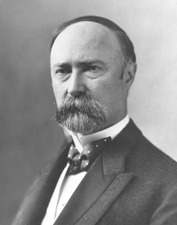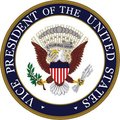Charles W. Fairbanks
|
|
Charles Warren Fairbanks (May 11, 1852 – June 4, 1918) was a Senator from Indiana and the twenty-sixth Vice President of the United States. He was born near Unionville Center, Union County, Ohio, and graduated from Ohio Wesleyan University, Delaware, Ohio, in 1872. Fairbanks was an agent of the Associated Press in Pittsburgh, Pennsylvania and in Cleveland, Ohio. He was admitted to the Ohio bar in 1874 and moved to Indianapolis, Indiana the same year.
Fairbanks was an unsuccessful candidate for election to the United States Senate in 1893. He was appointed a member of the United States and British Joint High Commission which met in Quebec City in 1898 for the adjustment of Canadian questions. He was elected as a Republican to the United States Senate in 1896 and reelected in 1902, and served from March 4, 1897 until his resignation March 3, 1905, having been elected Vice President of the United States. He was Chairman of the Committee on Immigration and the Committee on Public Buildings and Grounds. He was elected Vice President of the United States in 1904 on the Republican ticket with Theodore Roosevelt and served from March 4, 1905, to March 3, 1909. He sought the Republican presidential nomination in 1916, but lost. Then he won the nomination for vice president under Charles E. Hughes. Hughes and Fairbanks lost the election to Woodrow Wilson and Thomas Marshall.
Fairbanks resumed the practice of law in Indianapolis, where he died in 1918. He was interred in Crown Hill Cemetery.
The city of Fairbanks, Alaska is named after him.
Related articles
| Preceded by: Theodore Roosevelt | Republican Party Vice Presidential candidate 1904 (won) | Succeeded by: James S. Sherman | ||||
| Preceded by: Theodore Roosevelt | Vice President of the United States March 4, 1905 – March 3, 1909 | Succeeded by: James S. Sherman | ||||
| Preceded by: Nicholas M. Butler | Republican Party Vice Presidential candidate 1916 (lost) | Succeeded by: Calvin Coolidge
|
||||


